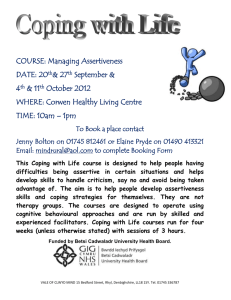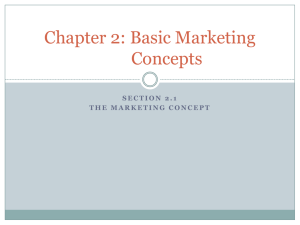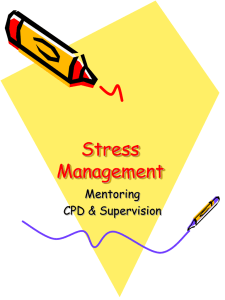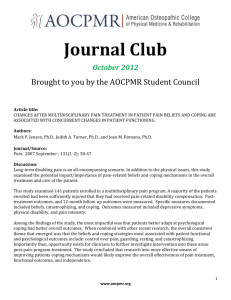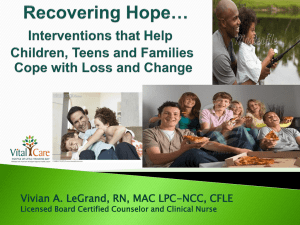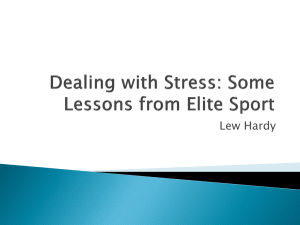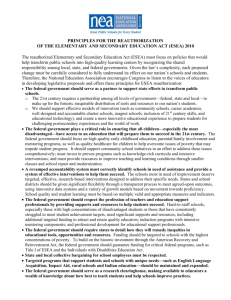Targeted Interventions Handout
advertisement
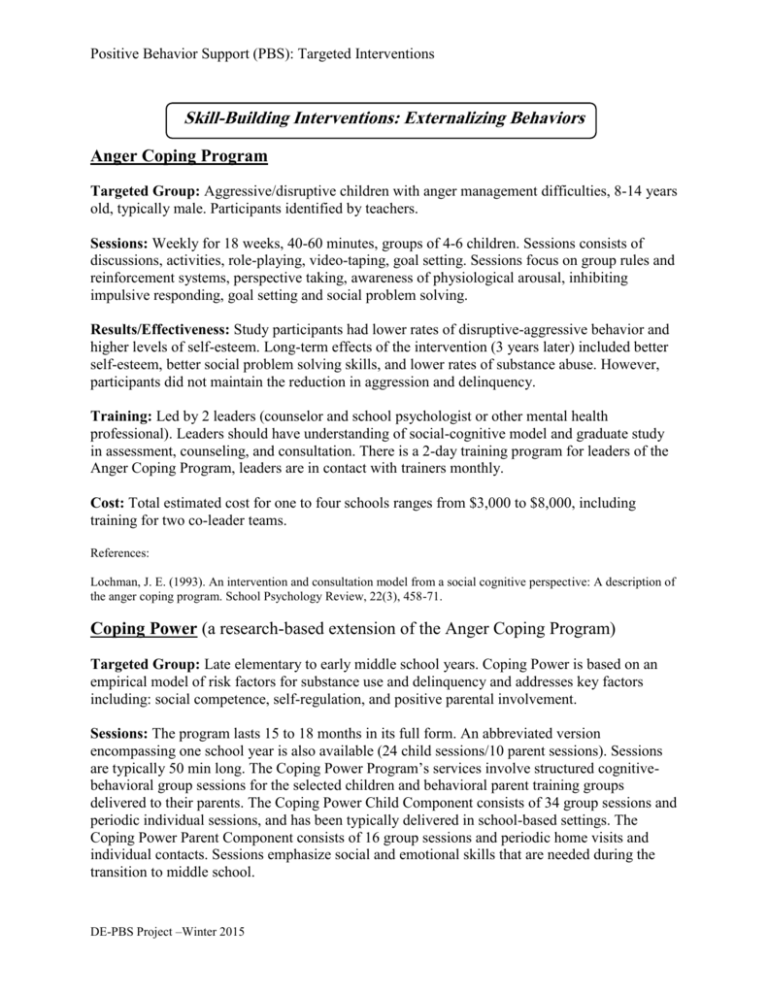
Positive Behavior Support (PBS): Targeted Interventions Skill-Building Interventions: Externalizing Behaviors Anger Coping Program Targeted Group: Aggressive/disruptive children with anger management difficulties, 8-14 years old, typically male. Participants identified by teachers. Sessions: Weekly for 18 weeks, 40-60 minutes, groups of 4-6 children. Sessions consists of discussions, activities, role-playing, video-taping, goal setting. Sessions focus on group rules and reinforcement systems, perspective taking, awareness of physiological arousal, inhibiting impulsive responding, goal setting and social problem solving. Results/Effectiveness: Study participants had lower rates of disruptive-aggressive behavior and higher levels of self-esteem. Long-term effects of the intervention (3 years later) included better self-esteem, better social problem solving skills, and lower rates of substance abuse. However, participants did not maintain the reduction in aggression and delinquency. Training: Led by 2 leaders (counselor and school psychologist or other mental health professional). Leaders should have understanding of social-cognitive model and graduate study in assessment, counseling, and consultation. There is a 2-day training program for leaders of the Anger Coping Program, leaders are in contact with trainers monthly. Cost: Total estimated cost for one to four schools ranges from $3,000 to $8,000, including training for two co-leader teams. References: Lochman, J. E. (1993). An intervention and consultation model from a social cognitive perspective: A description of the anger coping program. School Psychology Review, 22(3), 458-71. Coping Power (a research-based extension of the Anger Coping Program) Targeted Group: Late elementary to early middle school years. Coping Power is based on an empirical model of risk factors for substance use and delinquency and addresses key factors including: social competence, self-regulation, and positive parental involvement. Sessions: The program lasts 15 to 18 months in its full form. An abbreviated version encompassing one school year is also available (24 child sessions/10 parent sessions). Sessions are typically 50 min long. The Coping Power Program’s services involve structured cognitivebehavioral group sessions for the selected children and behavioral parent training groups delivered to their parents. The Coping Power Child Component consists of 34 group sessions and periodic individual sessions, and has been typically delivered in school-based settings. The Coping Power Parent Component consists of 16 group sessions and periodic home visits and individual contacts. Sessions emphasize social and emotional skills that are needed during the transition to middle school. DE-PBS Project –Winter 2015 Positive Behavior Support (PBS): Targeted Interventions Child sessions focus on: ability to set short and long term goals, organization and study skills, anger management skills, social skills, problem-solving skills, ability to resist to peer pressure, entry into positive peer groups. Parent sessions focus on: praise and positive attention, clear rules and expectations, promotion of child study skills, appropriate discipline practices, parental stress management, family communication and problem-solving, reinforcement of problem-solving skills the children the learn in Coping Power. Results/Effectiveness: Research examining Coping Power shows that the intervention produced a lower rate of substance use at the end of sixth grade than was apparent among children who received no interventions. Children receiving Coping Power have reductions in aggressive behavior and improvements in social cognitive processes by the end of the intervention. Coping Power was found to have positive effects on externalizing behavior and potentially positive effects on social outcomes for children classified with an emotional disturbance (What Works Clearinghouse). Cost: Total start up costs are $1773.90. Cost of training starts at $1500.00. Child Group Facilitator’s Guide: $59.95, Parent Group Facilitator’s Guide: $47.95, Child Group Workbooks (pack of 8): $67.50, Parent Group Workbooks (pack of 8): $98.50. Training: Training is conducted in a workshop over 2-3 days. Workshops are offered twice per year on the University of Alabama campus. On-site trainings for interested agencies and school systems can be arranged on an individual basis. The developers recommend a minimum of one consultation per month throughout the first year of program implementation. Feedback on a minimum of eight recorded sessions is required for obtaining “trainer” status. http://www.copingpower.com/TrainingSteps.aspx References: Boxmeyer, Caroline, Lochman, John, Powell, Nicole, Yaros, Anna,Wojnaroski, Mary,. (2007). A case study of the coping power program for angry and aggressive youth. Journal of Contemporary Psychotherapy, 37(3), 165-174. Lochman JE, W. K.,. (2002). The coping power program at the middle-school transition: Universal and indicated prevention effects. Psychology of Addictive Behaviors : Journal of the Society of Psychologists in Addictive Behaviors, 16(4), 40-54. http://ies.ed.gov/ncee/WWC/pdf/intervention_reports/wwc_copingpower_102511.pdf First Steps to Success Targeted Students: First Step to Success is an early intervention program, for students from kindergarten to 1st grade, designed to help children who are at risk for developing aggressive or antisocial behavioral patterns. Sessions: The program uses a trained behavior coach who works with each student and his or her class peers, teacher, and parents for approximately 50 to 60 hours over a three-month period. First Step to Success includes three interconnected modules: screening, classroom intervention, and parent training. The school intervention module focuses on reducing problem behavior and DE-PBS Project –Winter 2015 Positive Behavior Support (PBS): Targeted Interventions increasing adaptive, prosocial behaviors. A behavior coach works with the teacher while the teacher observes and learns the techniques necessary to implement the program. The student is taught to recognize and replace inappropriate behaviors with appropriate ones, which are subsequently reinforced by classroom peers who are taught positive strategies to support the student. This module involves 30 program days across three phases (coach, teacher, and maintenance) for completion. The behavior coach also meets with the student’s parents for approximately 45 minutes per week for six weeks. Parents are taught to focus on and encourage the following child competencies: communication, cooperation, limit setting, problem solving, friendship making, and confidence development. Results/Effectiveness: What Works Clearinghouse reports that First Step to Success was found to have positive effects on externalizing behavior, potentially positive effects on emotional/internalizing behavior, social outcomes, and other academic performance, but no discernible effects on reading achievement/literacy for children classified with an emotional disturbance. Cost: The cost of implementing the First Step to Success model is approximately $500 per student and includes materials and the behavioral coach’s time. Training: Five expert trainers are available to provide training to sites. The coaches participate in a 2-day training to learn about the program and the implementation sequence. The teachers participate in a 1-day training to learn about their responsibilities. The training structure incorporates didactic teaching, role plays, and question/answer demonstration. References: http://www.firststeptosuccess.org/ http://ies.ed.gov/ncee/wwc/pdf/intervention_reports/wwc_firststep_030612.pdf http://store.samhsa.gov/shin/content/SMA11-4634CD-DVD/EBPsPromisingPractices-IDBD.pdf Incredible Years Targeted Students: The Incredible Years is composed of training programs for children, parents, and teachers. The child program is designed for children (ages 0–12) with challenging behaviors and focuses on building social and emotional skills. Lessons can be delivered to children referred for difficult behavior or to an entire classroom as a preventative measure. Sessions: The program consists of 20 to 30 minute lessons two to three times a week; these lessons are reinforced by small-group activities, practicing skills throughout the day, and communicating with parents. Lessons cover recognizing and understanding feelings, getting along with friends, anger management, problem solving, and behavior at school. Parent training programs focus on positive discipline, promoting learning and development, and involvement in children’s life at school. DE-PBS Project –Winter 2015 Positive Behavior Support (PBS): Targeted Interventions Effectiveness/Results: What Works Clearinghouse reports that The Incredible Years program was found to have potentially positive effects on externalizing behavior and potentially positive effects on social outcomes for children classified as having an emotional disturbance. Cost: Total per-child costs range from $995-$1995, for school age, depending on which components are used. See http://incredibleyears.com/download/pricelist.pdf for a full list of prices. Training: Training participants for treatment groups should have a graduate degree in one of the following professions: social work, psychology, education, nursing, psychiatry, medicine, or have extensive experience working with families and children. For prevention groups, developers recommend that one leader have a graduate degree, and the second leader a bachelor’s level degree in a related field. The Incredible Years Program provides several training options, including attending training in Seattle, participating in another agency’s on-site training, or hosting your own on-site training (best if you have 15-25 staff to train). There are specific trainings for different age groups available. References: http://incredibleyears.com/ http://ies.ed.gov/ncee/wwc/pdf/intervention_reports/wwc_incredibleyears_111511.pdf Posthumus, J.A., Raaijmakers, M.A.J., Maassen, Gerard H., Engeland, H., Matthys, W. (2012). Sustained effects of incredible years as a preventive intervention in preschool children with conduct problems. Journal of Abnormal Child Psychology, 40(4), 487-500. Second Step Targeted Group: Second Step is a classroom-based social skills program for students in preschool through junior high (ages 4–14 years), with a distinct curriculum for each grade. It is designed to reduce impulsive, high-risk, and aggressive behaviors and increase children’s social competence and other protective factors. Sessions: Second Step consists of 20-23 lessons per year varying in length from 20-45 minutes. Lessons are designed so that they can be completed in a typical class period. The curriculum is divided into two age groups: preschool through 5th grade (with 20 to 25 lessons per year) and 6th through 9th grade (with 15 lessons in year 1 and 8 lessons in the following 2 years). Each curriculum contains five teaching kits that build sequentially and cover empathy, impulse control, and anger management in developmentally and age-appropriate ways. The preschool through fifth grade modules have an optional video-based parent training component. Results/Effectiveness: Results from a program evaluation with elementary school students indicated that the intervention group demonstrated significant reductions in aggression and gains in positive student behavior and social reasoning compared to peers in the control group. Another study reported significant improvements in social competence that include positive approach/coping, caring/cooperative behavior, and consideration of others. Conversely, a third study showed that teachers reported improved pro-social behavior for students participating in DE-PBS Project –Winter 2015 Positive Behavior Support (PBS): Targeted Interventions the program, but no overall changes in aggression and impulsivity. What Works Clearinghouse was unable to draw any conclusions based on research about the effectiveness or ineffectiveness of Second Step on children classified with an emotional disturbance (or children at risk for classification). Training: Although it is more likely that teachers would implement this program, it can be administered by any individual with regular, approved contact with students including teachers, counselors, and school psychologists. All participating teachers need to take a one-day training workshop prior to implementing the curriculum. This training will help teachers understand the purpose, structure, format, and strategies to be used in the curriculum. Cost: Kits for Early Learning, Kindergarten, Grade 1 are $379 each; Grades 2&3 are $329 each; Grades 4&5 are $359 each; and Grades 6-8 are $369 each. More specific pricing (training, additional teaching tools, etc. are located here: http://www.cfchildren.org/Portals/0/Purch/Purch_DOC/orderform-pricelist-spring2015.pdf) References: http://ies.ed.gov/ncee/wwc/pdf/intervention_reports/wwc_secondstep_030513.pdf http://www.edjj.org/focus/prevention/JJ-SE/TOOLS%20Step%201%20(2-28-07).pdf http://nrepp.samhsa.gov/viewintervention.aspx?id=66 Taub, J. "Evaluation of the Second Step Violence Prevention Program at a rural elementary school." School Psychology Review. 31.2, 2002, p186. Daly B.P., Nicholls E., Aggarwal R., and Sander M., Social Competence and Reducing Behavior Problems in AtRisk Students: Implementation and Efficacy of Universal and Selective Prevention Programs in Schools. Handbook of School Mental Health, Research, Training, Practice, and Policy, Series: Issues in Clinical Child Psychology, 2nd ed. 2014. DE-PBS Project –Winter 2015 Positive Behavior Support (PBS): Targeted Interventions Skill-Building Interventions: Internalizing Behaviors Coping Cat/ C.A.T. Targeted Group: Children and adolescents with anxiety disorders 7-13 years old. Coping Cat is a cognitive-behavioral therapy intervention that helps children recognize and analyze anxious feelings and develop strategies to cope with anxiety-provoking situations. The program can be adapted for older students (13-17) using the C.A.T. project which provides age appropriate material. Sessions: Program consists of 16 sessions. The first 8 sections focus on basic concepts, practice, and reinforcement, the last 8 sections focuses on practicing acquired skills in imaginary and real situations. Participants are gradually exposed to low and high anxiety situations. Results/Effectiveness: Both Coping Cat and Camp Cope-A-Lot (see below) findings suggest long term anxiety reduction. Participants self-reported a reduction in anxiety over time. There were not significant differences in parent/child satisfaction between Coping Cat and Camp CopeA-Lot. Cost: From Approximately $280.00 for Therapist’s Manual, The Coping Cat Video, Sessionby-Session Guide, Computer-Based Training (not including Child’s Workbook, $24.95 per child). The Camp Cope-A-Lot CD computer program can be incorporated into the program, this costs from $20-$2000 depending on the number of students using the computer program. Cost: The treatment package costs $335 and includes 1 User’s Guide, 1 Therapist Manual for Group Treatment, 1 Reference copy of the available evaluation materials used during the original study, 1 Therapist Manual for Individual Treatment, 1 Coping Cat Workbook, and 1 Reference copy of the age-appropriate PedsQL instruments. Training: Coping Cat therapists are trained providers with advanced degrees in psychology (masters/specialist/doctoral not specified). Therapist can utilize Session-by-Session Guide and Computer-Based Training. Camp Cope-A-Lot Camp Cope-A-Lot is based on the Coping Cat program. It is a computer-assisted program, while Coping Cat is manual based. Targeted Group: Children and adolescents with anxiety disorders 7-13 years old. Sessions: Same model as Coping Cat within 12 sessions. The first 6 sessions are completed by the student independently and the last 6 sessions are guided by a “coach”. Training: CCAL was designed to be implemented by practitioners who are not yet trained or experienced in Cognitive-Behavioral Therapy for anxious youth and requires fewer therapist hours. DE-PBS Project –Winter 2015 Positive Behavior Support (PBS): Targeted Interventions Cost: $200, which includes: Individual Purchase Base Package (required for initial use): 1 CCAL CD ROM; 1 Therapist ID (access to the program for 1 therapist/coach); 1 Therapist Manual (“Coach’s Manual”); 1 Child Workbook (“Go-to-Gadget”); 1 Trial use (1 trial use for each therapist ID); 1 Child ID (1 child/camper use per therapist ID) References: Podell, Jennifer L., Mychailyszyn, Matthew, Edmunds, Julie, Puleo, Connor M., Kendall,Philip C.,. (2010). The coping cat program for anxious youth: The FEAR plan comes to life. Cognitive and Behavioral Practice, 17(2), 132141. Kendall, P. C., Khanna, M. S., Edson, A., Cummings, C., & Harris, M. S. (2011). Computers and psychosocial treatment for child anxiety: Recent advances and ongoing efforts. Depression and Anxiety, 28(1), 58-66. ACTION Targeted Group: Girls 9-12 years old experiencing depression. Intervention is also appropriate for boys (separate workbook provided for boys) and can be modified for younger and older students. Sessions: 20 group meetings and 2 individual meetings completed in 11 weeks. Intervention includes: psycho-education; goal setting; coping skills training; problem solving training; cognitive restructuring; and activities that build a positive self- schema. Additional treatment procedures include training in self-monitoring, self-evaluation, and self-reinforcement. Parent training can also be provided as part of the program. Results/Effectiveness: A large scale evaluation of the ACTION program found that 80% of girls who participated were no longer depressed following treatment, regardless of whether or not their parents participated in the parent training. Cost: $152.85 includes manuals and videos (Does not include workbooks for both children and parents, $26.95 and 22.95 each). Training: Initial studies had doctoral students implementing the ACTION program; they were already trained in cognitive behavioral therapy. The biggest challenge is maintaining both flexibility and fidelity when implementing the program. This is difficult for inexperienced practitioners who are more likely to follow the exact guidelines of the manual; this inflexibility could possibly reduce the effectiveness of the program. Workshops alone have not demonstrated the ability to produce the necessary treatment fidelity that enables school psychologists to effectively implement similar evidence-based treatments. Supervised clinical training, monitoring of treatment implementation, and ongoing supervision are necessary parts of training. (There does not seem to be a current training program for therapists available at this time) DE-PBS Project –Winter 2015 Positive Behavior Support (PBS): Targeted Interventions References: Stark, K. D., Arora, P., & Funk, C. L. (2011). Training school psychologists to conduct evidence-based treatments for depression. Psychology in the Schools, 48(3), 272-282. Adolescent Coping with Stress Course (Clarke & Lewinsohn, 1995) Targeted Group: The Adolescent Coping with Stress Course is a psycho-educational, cognitivebehavioral intervention for the prevention of unipolar depression in high school adolescents (1318 years old) who have an increased risk of depression. It is not meant to be a treatment for active episodes of depression. Sessions: The Adolescents Coping With Stress Course consists of 15 one-hour sessions, which can be offered at a pace of 2 to 4 times per week for 45-60 minutes, depending on site capabilities and needs. The first few sessions provide an overview of depression, its relationship to stressful situations, and an introduction to other group members. Subsequent sessions focus on training cognitive-restructuring skills and techniques for modifying irrational or negative selfstatements and thoughts, which are hypothesized to contribute to the development and maintenance of depressive disorder. Results/Effectiveness: A study of the Adolescent Coping with Stress Course showed a significant 12-month advantage for the prevention program. Students with affective disorder who participated had a total incidence rate of 14.5% versus 25.7% for the control condition. No significant effects were found for parent reports of child depression, or behavior problems on externalizing and internalizing scales. Training: CWS groups are led by specially trained school psychologists and counselors who have a minimum of a master's degree in clinical, counseling, or educational psychology, and who have previous experience in conducting psycho-educational groups with adolescents. Before beginning the group sessions, therapists are provided with 40 hours of training, including mock intervention sessions, role-playing adolescent responses to exercises, homework, and videotaped feedback. Cost: Program materials are free, and the minimum staffing should be at least a masters level individual with experience in CBT. About 60 hours minimum is needed for an initial group and about 45 hours for later groups. References: http://www.kpchr.org/research/public/common/getdocpublic.aspx?docid=6E294BF5-42EE-4AD0-A1B2-90AB1A116606 http://www.promisingpractices.net/program.asp?programid=151#programinfo Penn Resiliency Program (PRP) (Gillham & Reivich, 2008) Targeted Group: PRP is a cognitive–behavioral group intervention designed for youths in late childhood and early adolescence (ages 10–14 years). The Penn Resiliency Program aims to DE-PBS Project –Winter 2015 Positive Behavior Support (PBS): Targeted Interventions prevent depression by teaching cognitive and behavioral skills before students encounter the challenges associated with the transition from childhood to adolescence. Sessions: PRP is typically delivered in 12 90-minute lessons or 18 to 24 60-minute lessons. Some projects have used shorter versions of PRP. Within each lesson, resilience concepts and skills are presented and practiced in a variety of ways. Skills are introduced through skits, role plays, short stories, or cartoons that illustrate the core concepts. In PRP students learn to detect negative thoughts, to evaluate the accuracy of those thoughts, and to challenge negative beliefs by considering alternative interpretations. PRP also teaches a variety of strategies that can be used for solving problems and coping with difficult situations and emotions. Students learn techniques for assertiveness, negotiation, decision-making, social problem-solving, and relaxation. The skills taught in the program can be applied to many contexts of life, including relationships with peers and family members as well as achievement in academics or other activities. Results/Effectiveness: Findings from the initial efficacy study were promising as PRP prevented depressive symptoms through 2 years of follow-up and reduced the risk for clinically relevant symptoms. Since that initial study, however, PRP research findings have been inconsistent. The majority of studies evaluating PRP have found beneficial effects on depressive symptoms in either the overall sample or subgroups of participants. But at least four studies found no significant effects. Training: PRP group leaders have included PRP’s developers, graduate students in psychology and education, mental health professionals, and school teachers and counselors. Group leaders typically receive extensive training and supervision. These trainings may be anywhere between 3-10 days in length depending on the needs of the particular group. During this training, group leaders learn about cognitive theories of childhood depression and social-emotive intervention strategies. They observe and practice curriculum delivery and receive extensive feedback and coaching from PRP’s developers and other members of our team. In addition, group leaders participate in group supervision meetings once every 1-2 weeks while they are delivering the PRP intervention. Training sessions are primarily for teachers and counselors who are part of Penn research studies, It is not possible for other teachers and counselors to attend these trainings. Organizations that are interested can request a training. Cost: Manuals can be requested by qualified researchers but cannot be purchased yet by the general public. A program based on the PRP costs $516 ($43 per session) and includes all materials. References: Brunwasser, S. M., Gillham, J. E., & Kim, E. S. (2009). A meta-analytic review of the Penn Resiliency Program’s effect on depressive symptoms. Journal of Consulting and Clinical Psychology, 77(6), 1042-1054. doi:10.1037/a0017671 http://www.ppc.sas.upenn.edu/prpsum.htm http://mhws.agca.com.au/mmppi_detail.php?id=54 DE-PBS Project –Winter 2015 Positive Behavior Support (PBS): Targeted Interventions FRIENDS or Friends for Life (Barrett, 1999, 2004, 2005) Targeted Group: FRIENDS has two parallel forms, one for children (ages 6 to 11 years) and the other for youth (ages 12 to 16 years). FRIENDS is a group cognitive behavioral treatment for clinically anxious children. FRIENDS is designed to be used in the classroom to increase the resilience and happiness of children. It teaches children and families cognitive, emotional and behavioral skills for managing feelings and coping with life challenges with a positive and resilient attitude. It promotes important personal development concepts such as identity, selfesteem, problem solving, self-expression and building positive relationships. Sessions: The FRIENDS program involves ten weeks of 1 to 1.5 hour sessions to be run in class time, and has corresponding homework tasks for each session so the skills can be practiced at home with families. Schools may choose to complete the program over a 10-week period, or choose to conduct shorter sessions over a longer period of time. At the conclusion, there is also the option to run two booster sessions via homework tasks, where the students can review their progress and revisit the FRIENDS management plan. Parents have an opportunity to support their children and learn more about FRIENDS themselves by attending two parent sessions that may be arranged by the school. Results/Effectiveness: Multiple studies document positive behavioral outcomes at post-test, with at least one study indicating positive behavioral impacts at follow-up at least one year after the intervention ended. Training: FRIENDS has been specifically designed for use in early childcare centers, kindergartens and schools as a universal preventative program, run by teachers in normal class time. All teachers must first receive training, provided by Pathways Health and Research Centre prior to running the program. Private workshops for FRIENDS are regularly held in various states. It may be possible to conduct the sessions with smaller, more focused groups of students as a targeted intervention. Cost: Approximately $93.00 for teachers manuals, resource CD, and poster. Student workbooks are from $17.60- $18.70 each, depending on the age group. It costs $350 per person to attend a training workshop. Full staff in-services, where schools host the training day, costs $3,000 (price is negotiable depending on the number of participants). References: https://www.kidsmatter.edu.au/primary/programs/friends-life http://www.pathwayshrc.com.au) Shortt A.L., Barrett P.M., Fox T.L., Evaluating the FRIENDS Program: A Cognitive-Behavioral Group Treatment for Anxious Children and Their Parents, Journal of clinical child psychology, Vol. 30, No. 4, 2001, pp. 525 DE-PBS Project –Winter 2015 Positive Behavior Support (PBS): Targeted Interventions Skill-Building Interventions: General Skillstreaming the Elementary School Child and Skillstreaming the Adolescent (Goldstein) Targeted Group: Aggressive Elementary and high school students. Sessions: 45-50 min, 2 sessions per week. Duration of program can be decided by the number of skills needed to be taught. The program can be adapted to last from 2 days to 3 years. Includes modeling, role-playing, performance feedback, and generalization training. Results/Effectiveness: There is some evidence that suggests Skillstreaming improves social skills and reduces the need to discipline in school. http://interventioncentral.mysdhc.org/interventions/Skillstream-ERIC.pdf Cost: (for both Elementary and Adolescent) Guide with data CD: $46.95; DVD-Educator Training DVD including Elementary and Adolescent program books: $125; Student Manual: $14.95; Skill Cards: $29.95; Lesson Plans and Activities: $64.95; Set of 60 posters: $74.95 Training: A wide variety of professionals can be trained to initiate Skillstreaming, including teachers, counselors, school psychologists, and social workers. The person must become familiar with the Skillstreaming program through the Skillstreaming books, materials, and video. They can also attend a Skillstreaming training preparation workshop. They can then attend a “mock Skillstreaming group”, which is a role-playing exercise led by experienced trainers. They can observe a group session and co-lead a group session. After these trainings they will be ready to lead a group session alone, although it is recommended that there are 2 trainers per group. References: Goldstein, A. P., McGinnis, E., Sprafkin, R. P., Gershaw, N. J. & Klein, P. (1997). Skillstreaming the Adolescent: New Strategies and perspectives for teaching prosocial skills (Revised). Champaign, Illinois: Research Press. http://www.skillstreaming.com/ Social Skills, Group Intervention (S.S.GRIN) Targeted Group: Social Skills Group Intervention (S.S.GRIN) is a social skills curriculum for children in grades three through five who display immature behavioral self-regulation and social skills relative to their peers (e.g., impulse control problems), are being rejected and teased by peers (e.g., bullying and victimization), or are socially anxious and awkward with peers. Sessions: S.S.GRIN is a 10-week curriculum (one 60-min session per week). Sessions include modeling, positive reinforcement, and cognitive reframing to support the specific skills covered, as well as lectures, role-plays, brainstorming, games, and other activities. Although S.S.GRIN has primarily been implemented in a school setting, the program also can be implemented in after-school, community, and clinical settings. DE-PBS Project –Winter 2015 Positive Behavior Support (PBS): Targeted Interventions Results/Effectiveness: Evaluation of S.S.GRIN revealed that children in the intervention group, who were already demonstrating poor social skills and negative interactions with peers, demonstrated gains in peer liking, self-esteem and self-efficacy, and reductions in social anxiety relative to the control group. In addition, those children rated as especially aggressive at baseline demonstrated more significant reductions in aggressive and bullying behavior as compared to aggressive control children. When S.S.GRIN was evaluated at 1-year follow-up, the original gains were maintained and additional improvements included improved social acceptance and self-esteem and lower symptoms of depression and anxiety. Training: Online training is included with the purchase of the S.S.GRIN kit; the 6 hours of instruction can be completed at teachers' convenience. On-site training is also available. Cost: A 1-year online subscription to S.S.GRIN 3-5 cost $120, all materials are downloadable with subscription. The 1 day on-site training is $2,500 for up to 25 participants, plus travel expenses (not required). References: http://www.nrepp.samhsa.gov/ViewIntervention.aspx?id=217 http://www.3cisd.com/marketplace/catalog/201/SSGRIN-3-5 http://www.militaryfamilies.psu.edu/programs/ssgrin-3-5-social-skills-group-intervention Daly B.P., Nicholls E., Aggarwal R., and Sander M., Social Competence and Reducing Behavior Problems in AtRisk Students: Implementation and Efficacy of Universal and Selective Prevention Programs in Schools. Handbook of School Mental Health, Research, Training, Practice, and Policy, Series: Issues in Clinical Child Psychology, 2nd ed. 2014. DE-PBS Project –Winter 2015 Positive Behavior Support (PBS): Targeted Interventions Relationship-Building Interventions Good Behavior Game Targeted Group: Pre-school to 12th grade. The Good Behavior Game aims to reduce early aggressive and disruptive behavior in the classroom. Probably suitable for high risk classrooms, however, it does not meet our targeted criteria of being available quickly with minimal teacher time. Description: The class is divided into two teams and a point is given to a team for any inappropriate behavior displayed by one of its members. The team with the fewest number of points at the Game's conclusion each day wins a group reward. If both teams keep their points below a preset level, then both teams share in the reward. Teachers clearly define negative behaviors and when the game will be in effect. Results/Effectiveness: GBG has been shown to reduce aggressive, disruptive behavior and increase on-task behavior for students by the end of first grade, and lower the age of first-time smoking for students by middle school. GBG has also been shown to reduce students’ use of mental health and behavioral services from 1st grade through young adulthood. For young adults, especially males who were aggressive and disruptive, playing GBG as a child can have long-term impacts on mental health, smoking, and drug and alcohol abuse. Cost: Good Behavior Game kit for Classroom teachers (required for all trained teachers): $299; Good Behavior Game kit for school support staff and administration: $235; 1 day on-site training for implementing Good Behavior Game: $2900 for up to 40 people, plus travel expenses; 3 day, off-site National or Regional training of PAX Partners who can be accredited to mentor and induct new teachers or staff within school or district for implementing and using Good Behavior Game $2500 per person, plus their own travel expenses. Training: While detailed instructions can be found online, The American Institute for Research (AIR) can be contacted for training. AIR works with school districts and communities on all aspects of GBG implementation, including planning, providing training to teachers and local coaches, and monitoring practices over time. References: Poduska JM, Kellam SG, Wang W, Brown CH, Ialongo NS,Toyinbo P,. (2008). Impact of the good behavior game, a universal classroom-based behavior intervention, on young adult service use for problems with emotions, behavior, or drugs or alcohol. Drug and Alcohol Dependence, 95, 29-44. http://www.blueprintsprograms.com/programCosts.php?pid=91032ad7bbcb6cf72875e8e8207dcfba80173f7c http://www.interventioncentral.org/behavioral-interventions/schoolwide-classroommgmt/good-behavior-game DE-PBS Project –Winter 2015 Positive Behavior Support (PBS): Targeted Interventions Positive Action Targeted Group: Positive Action, a K–12 program, aims to promote character development, academic achievement, and social-emotional skills and to reduce disruptive and problem behavior. This program is primarily a Tier 1 (universal) intervention with Tier 2 (targeted) components. Sessions: The program consists of 140 lessons taught 2-4 times a week in 15-20 min sessions. All lessons are scripted and use classroom discussion, role-play, games, songs, and activity sheets or text booklets. Optional components that may or may not be implemented as part of the program are: site-wide climate development; drug education for grade 5 and middle school; conflict resolution; counselor, parent, and family classes; and community/coalition components. Results/Effectiveness: Positive Action was found to have positive effects on elementary school students' behavior and academic achievement (What Works Clearinghouse). Cost: Instructor kits: Pre-K through grade 12 kits, Grade 5 Drug Education Supplement Kit, Middle School Drug Education Supplement Kit, Bullying Supplement Kit (elementary or secondary): $250-460 each; Additional component kits: Climate Development Kit, Counselor’s Kit, Family Kit, Family Classes Instructor’s Kit, Parenting Classes Instructor’s Kit, Community Kit: $85-14,50 each; 1- to 5-day, on-site orientation, ongoing/refresher training, training of trainers, or professional development training $2000 per site per day plus $1000 per travel day and travel expenses; Off-site training (at another site's training): $250 per participant per day Training: Several training options are available for educators: online, on-site orientation, on-site training, on-site media training, and self-training kits. The recommended length of a training session varies by the size of the implementation and the number of participants. A training session will cover the Pre K-12 curriculum, climate development, family/parent and community programs; and the Climate results from delivering the content through the tools. It will also cover the evidence base for the outcomes. It is interactive with group presentations. References: https://www.positiveaction.net/ http://ies.ed.gov/ncee/wwc/interventionreport.aspx?sid=380 DE-PBS Project –Winter 2015 Positive Behavior Support (PBS): Targeted Interventions Check and Connect Targeted Students: Check & Connect is a comprehensive intervention designed to enhance student engagement at school and with learning for marginalized, disengaged students in grades K-12, through relationship building, problem solving and capacity building, and persistence. Students are referred to Check & Connect when they show warning signs of disengaging from school, such as poor attendance, behavioral issues, and/or low grades. Sessions: The connect component includes two levels of student-focused interventions developed to maximize the use of finite resources: basic intervention, which is the same for all students, and intensive interventions, which are more frequent and individualized. All students receive basic interventions (even if receiving intensive interventions), whereas indicators of student engagement are used to guide who receives the delivery of more intensive interventions. Student levels of engagement are systematically monitored monthly (weekly for elementary students) and documented using a monitoring sheet. Results/Effectiveness: What Works Clearinghouse found positive effects on staying in school and potentially positive effects on progressing in school. There were no discernible effects found on completing school on time (within four years of entering ninth grade). There is no current evidence to show that C&C is effective or ineffective with students classified as having emotional disturbance. Cost: Mentor trainings cost $575 per person. Implementing the program in a secondary school costs about $1,400 per student. Training: Check & Connect is implemented by a trained mentor whose primary goal is to keep education a salient issue for disengaged students and their teachers and family members. The mentor works with a caseload of students and families over time and follows their caseload from program to program and school to school. There are several training options for mentors. Mentors and administrators can attend a 2 day training sessions or 1 day workshops for those already familiar with C&C, on-site training is also available. There are also refresher courses for mentors already implementing C&C. References: http://www.ndpcsd.org/documents/Evidence_Based_Practices/Check_and_Connect_Description.pdf http://ies.ed.gov/ncee/wwc/interventionreport.aspx?sid=78 http://ies.ed.gov/ncee/wwc/interventionreport.aspx?sid=79 DE-PBS Project –Winter 2015
